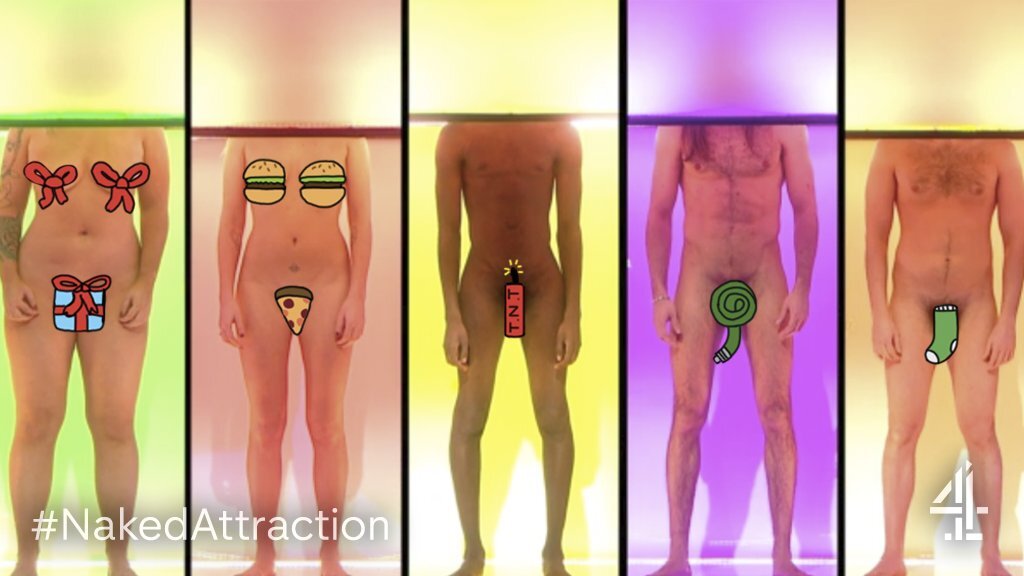naked attraction: can a show centred on objectification be empowering?
Channel 4 is home to a variety of weird and wonderful TV shows, from family favourites like Gogglebox and Come Dine with Me, to the more X-rated Embarrassing Bodies and the aptly titled Sex in Lockdown: Keep S**gging and Carry On. But none seem to test the boundaries of bizarre British entertainment quite like Naked Attraction - a show which poses the question; can picking a partner solely on their natural beauty help us find the one? While it’s hard to take anything seriously when confronted with six exposed penises (or vaginas), the show certainly provides an interesting contrast to the proverb ‘love is blind’ in the age of dating shows like Dating in the Dark and Love Is Blind.
The show’s premise of ‘dating in reverse’ is, in some regards, inherently problematic as it assumes that the nature of attraction is purely physical. Six people stand exposed behind a screen as their bodies are revealed to us bit by bit (literally). The weekly contestant and host make awkward comments about toenail grooming and ‘confident’ stances while the camera zooms uncomfortably close onto people’s genitals. It is a wholly disorientating experience for both the audience and the participants, resulting in one particularly flustered contestant walking off stage to pull himself together. The candidates are displayed like objects in harshly lit fluorescent boxes and selected like meat at the market. It would then seem that Naked Attraction embodies the essence of objectification - so why then do most contestants say that they found the experience empowering?
As a viewer, it can seem puzzling why these people would subject themselves to this level of public scrutiny and embarrassment. It’s hard enough being naked in private, let alone taking your kit off for the national public. However, discussions of bodies, sex and desire are handled so casually on the show (credit to the host Anna Richardson). The nudity is so blatant throughout, from the startling opening montage of naked bodies, that the most cringe worthy moment comes at the end of the episode - which sees the contestants fully clothed on an awkward date. Nudity, therefore, is presented as anything but shameful and its honesty is applauded. Contestants are even asked to describe their favourite parts of their bodies and say what they find attractive about their competitors, turning scrutiny into praise.
In fact, the harsh lighting and audience-less room make the spectacle almost anti-pornographic and even clinical, as if we are dissecting bodies in a lab. There is nothing inherently sexual in the presentation of nudity on the show and discussions on sex are even accompanied by the occasional scientific fact about human anatomy. The controversy behind the concept of Naked Attraction instead reveals a larger issue of society’s sexualisation of the naked form which the show appears to deconstruct (whether intentionally or not.)
The bodies are not retouched, and they represent a wide range of body types, ages, ethnicities, genders and sexual orientations. According to Anna Richardson, Naked Attraction is “a massive celebration […] because even though it’s about nakedness, it’s actually about acceptance and inclusion.” It certainly embodies the saying ‘there’s something for everyone’, as those with preferences for tattoos, muscles, big boobs or small ones are all met. This inclusive representation on national TV presents a welcome alternative to the unrealistic bodily expectations promoted by Hollywood and the fashion industry. In the age of Instagram influencers and glorified reality television, we are constantly exposed to the ‘ideal’ body type; however, Naked Attraction is a welcome reminder that there is no perfect body type and people come in a range of different shapes and sizes.
It would be going too far to suggest that Naked Attraction makes any ground breaking statements on diversity in the 21st Century. Ultimately, it is an amusing dating show in which people take their clothes off for public entertainment. The show profits from the commodification of people’s bodies and can therefore be seen as the height of objectification. However, the show also goes a long way in normalising nudity and desexualising the body. The question posed of ‘what do men and women really find attractive?’ is never definitively answered as it becomes greatly apparent that attraction is subjective. Therefore, to some extent, Naked Attraction invalidates the shame that surrounds nudity in our society. The contestants’ brazen attitude towards nudity is commendable and courageous - however, it still baffles me why anyone would sign themselves up!
Juliette Grossman is a third year English Literature student at the University of Edinburgh and an avid fan of the show!

